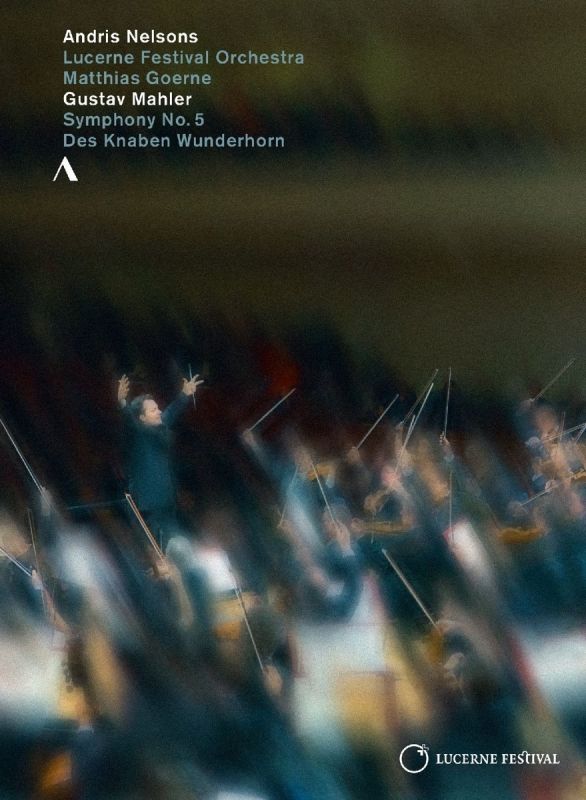MAHLER Symphony No 5. Selected Songs from 'Des Knaben Wunderhorn'
View record and artist detailsRecord and Artist Details
Composer or Director: Gustav Mahler
Genre:
Orchestral
Label: Accentus
Magazine Review Date: 09/2016
Media Format: Digital Versatile Disc
Media Runtime: 122
Mastering:
DDD
Catalogue Number: ACC20354

Tracks:
| Composition | Artist Credit |
|---|---|
| Symphony No. 5 |
Gustav Mahler, Composer
Andris Nelsons, Conductor Gustav Mahler, Composer Lucerne Festival Orchestra |
| Lieder aus 'Das Knaben Wunderhorn' |
Gustav Mahler, Composer
Andris Nelsons, Conductor Gustav Mahler, Composer Lucerne Festival Orchestra Matthias Goerne, Baritone |
Author: Edward Seckerson
Nelsons takes his time over everything – including the contentious Adagietto. The opening funeral march – launched by the plangent trumpet of Reinhold Friedrich (a player who finds music and tone even in extremis) – has an affectingly ‘cantorial’ quality, measured (very) and super-expressive. And Nelsons carries that fierce intensity into the second movement ‘flipside’ of the first, relishing the dark saturations and finding something really still and profound in the slow incantation for solo cellos near the heart of the movement. Old voices in mourning. The excellent video production allows us to see a lot of Nelsons and in this frozen moment in time we realise why it takes as long as it takes. Equally telling – and so much more affecting when you can see Nelsons’s face – is the hugely expressive rubato he brings to the exultant climax where we glimpse the symphony’s thrilling coda.
Taking one’s time over the huge Scherzo is always the right course of action – Mahler was clear about that – and Nelsons relishes the characterful ‘diversions’ and sumptuous moments of reflection in the marvellous first horn, Alessio Allegrini – moments which open up thrilling vistas. The silence of nature simply stopping and listening is clearly what Mahler had in his mind’s ear. Those pauses must be respected.
The Adagietto is said to have grown too slow according to certain commentators – and Mahler himself suggested as much. But again you watch Nelsons and you hear the lightness on the string and the gently flecked harp, and it just ‘breathes’. It might even increase the sensation of the Adagietto music airborne in the finale. Nelsons and his orchestra are predictably joyous and the coming-together of the earlier chorale and delirious helter-skeltering strings is ridiculously exciting.
First come eight of the Wunderhorn song settings with Matthias Goerne – but no texts on the screen or in the booklet. Not good. Goerne sings beautifully (though with a little too much swaying and hand-play for my taste); and even where one might prefer the maternal contralto sound – in ‘Das irdische Leben’ and ‘Urlicht’ (which are magically juxtaposed) – he is persuasive. The latter is blessed by majestic close-harmony trumpets and the most rapturous of oboe solos.
But, of course, the two military songs – ‘Revelge’ and ‘Der Tamboursg’sell’ (the former with its trenchant echoes of the Sixth Symphony) – are in a natural place for Goerne; and while I would have liked a little more verbal theatricality, his darkest colours chime with Mahler’s grim wind-band underscoring the drummer boy’s heartbreaking ‘gute Nacht’ with
real pathos.
Discover the world's largest classical music catalogue with Presto Music.

Gramophone Digital Club
- Digital Edition
- Digital Archive
- Reviews Database
- Full website access
From £8.75 / month
Subscribe
Gramophone Full Club
- Print Edition
- Digital Edition
- Digital Archive
- Reviews Database
- Full website access
From £11.00 / month
Subscribe
If you are a library, university or other organisation that would be interested in an institutional subscription to Gramophone please click here for further information.




